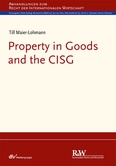I. Elevated relevance of property in insolvency cases
561
At its core, insolvency law aims at collectively protecting the creditors in cases in which not all outstanding debts and claims can be served. Underlying most national laws is the idea of the pari passu (literally, in equal steps) sharing principle, according to which generally all creditors are entitled to an amount of the debtor’s assets which mirrors the relation between their respective claims and the sum of overall outstanding debts.1152 A key aspect of (and not an exception to) this principle is that the assets that form part of the pie that can be distributed consist of the debtor’s assets – assets of other persons are generally beyond the reach of creditors.1153 The fact that the owner of goods in the debtor’s possession might simultaneously be a creditor of said debtor does not deprive him or her of the possibility to vindicate the goods from the debtor, since these goods were never part of the pie that has to be shared by all creditors. Since the remaining assets of the debtor might (and will often) be so few that a contractual claim (for example, under
562
For example, under English law, pre-liquidation real rights, such as rights and remedies of those who own things in the possession of the company are respected even in bankruptcy.1154 English law does not stop there, but appears to extend the availability of remedies of the contractual partner in insolvency if property has already passed to the buyer: While generally an owner’s claim for delivery up of the goods will not be granted if damages are adequate in line with the test for specific performance under a sales contract,1155 the overlap between delivery up and specific performance stops with the contractual partner becoming insolvent. While a specific performance claim would still not be granted, the remedy of delivery up becomes available to protect the owner of the goods, even though the goods are not unique and there are no further reason why damages would not be appropriate, aside from the limited value such a claim will generally have in insolvency.1156 This exemplifies how property is of elevated relevance in insolvency even under English law which generally does not approach property with such extensive protection, including the reallocation of possession as is common in many other legal systems.
563
Under German law, the insolvency estate is limited to the debtor’s assets (section 35 German Insolvency Code). If the insolvent party is in possession of goods in which a different party has absolute property, the latter party can claim the goods under section 47, sentence 2 of the German Insolvency Code, section 985 of the German Civil Code. In this regard, this party is not considered to be a party to the insolvency proceedings. The protection offered by section 47 of the German Insolvency Code is not restricted to property in goods but rather excludes from the insolvency proceedings all claims to things that do not form part of the insolvency estate.1157 Similarly, under Swiss law, goods that are not part of the insolvency estate can be reclaimed (Article 242 of the Swiss Debt Enforcement and Bankruptcy Law). While this action is, once again, not limited to property, property in the goods is the most important case of application.1158
564
Thus, while the details of national insolvency laws differ, the property in the goods is of pivotal importance under most of them. This is because property in the goods generally allows the owner to reclaim the goods without becoming a party to the insolvency proceedings.
| 1152 | Calnan, para. 1.01. |
| 1153 | Calnan, paras. 1.75 et seq. |
| 1154 | Goode/McKendrick, paras. 31.14–31.17. |
| 1155 | See on the same test under specific performance of a sales contract and delivery up, McCardie J in Cohen v Roche [1927] 1 KB 169, 180–181, as cited by Burrows, Remedies, p. 494. |
| 1156 | Burrows, Remedies, p. 495. |
| 1157 | Cf. Stadler, Verkehrsschutz durch Abstraktion, p. 450 citing BT-Drucksache 12/2443, Begründung zum Regierungsentwurf. § 54 InsO, p. 124 who, for this reason, states that property in the goods is not always decisive. |
| 1158 | BSK SchKG/Bauer, Art. 242 SchKG para. 15. |


